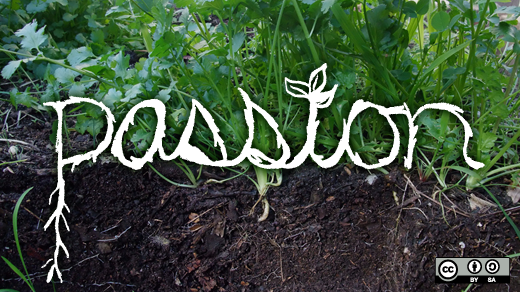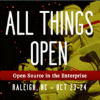Angie Byron is an advocate for Drupal. Commonly known online as webchick, she is a Drupal core co-maintainer. She has her finger on the pulse of the community, helping to manage over 1,600 contributors from all over the world.
In this interview, Angie shares the top five things she loves about the Drupal community, how she got started in open source, her passion for getting more newbies and women involved in open source, as well as her best tips for community management.
Plus, she's speaking at the upcoming All Things Open conference in Raleigh, NC and gives us a sneak preview to her keynote and session talk.

What does it mean to be a Drupal core co-maintainer?
As a co-maintainer, my job is to perform final review of proposed changes to Drupal core from over 1,600 contributors around the world. I do things like check patches over for utilization of development best practices, ensure they have sufficient automated tests and documentation and that coding standards are followed, and look out for things like performance and UX (uesr experience) regressions. I also tend to wear the "cat herder" uniform in this role; that is, find people who are working on similar things and encourage them to work together, help get contributors un-stuck by committing patches that unblock their work, helping to mediate conflicts, and so on.
What are your top 5 favorite things about the Drupal community?
- I love the passion of the Drupal community. For example, at contribution sprints every DrupalCon, we have hundreds of people huddled around tables with laptops and whiteboards, talking excitedly and gesturing furiously about the next big improvement they're working on.
- I love the knowledge-sharing that the Drupal community does. We have a very collaborative nature. If you learn something cool, your first instinct is to go and tell 10 people about that cool thing you just learned. We try hard to reject "RTFM" culture, in favour of bringing people along.
- I love the inclusiveness of the Drupal community. We go out of our way to ensure that everyone, from a hardcore developer to a designer to someone who happens to have IE, has on-ramps to contribute to the project. At major Drupal sprints, we always ensure that there is mentor-led free training available for people new to Git, how the issue queue works, what a patch is, etc.
- I love the diversity of the Drupal community. We enjoy a 20% participation rate of women, have over 600 local user groups on every corner of the earth, etc. We still have a lot of work to do, but I'm proud of what we've achieved so far and the willingness most have to make the situation better.
- I love the self-criticality of the Drupal community. We are not afraid to take a cold, honest look at things we've done wrong in the past and do even radical changes to fix them.
You got started in open source as a student at the Google Summer of Code in 2005. What kickstarted your love for contributing to open source?
I learned about the free software movement through the hacker movement (all of the literature I read back when I was a teenage renegade said to download something called "Linux" :)), and I was utterly amazed by the idea of smart people from all over the world collaborating together to make top-class software which is then given away to anyone with an interest in using it or learning more about how it works. I felt this had profound, empowering implications for education, activism, and even just global humanism.
I proceeded to dutifully follow various FLOSS project mailing lists, become "that girl" who'd always obnoxiously speak up in class that we should be learning PHP in addition to VB.NET, replaced crappy and insecure software on my family's computer with open source alternatives, and tinker around with open source technologies, especially Linux.
Ironically, though, despite all of my enthusiasm around the ideals embodied in free software and open source, it actually took me 10 years to work up the gumption to actually try my hand at contributing to a project myself. I had built up this total "Einstein complex" around contributing to open source, that you had to be a genius to do so. It wasn't until Google Summer of Code that I had an idea I might be able to actually participate, rather than merely cheer from the sidelines.
What got me into Drupal was a website called "Spread Firefox" which was a grassroots marketing platform for the Firefox web browser. It allowed anyone around the world to upload posters, graphics, events, etc. in order to help get the word out. I'm someone who habitually "views source" on any web page I visit to find out what's going on under the hood, so Drupal stuck out to me in the list of Google Summer of Code mentoring organizations.
And within Drupal, I found a community that embraced my desire to help and pointed me to where to be most effective, helped me learn the things I didn't know, and through it I've met thousands of some of the smartest, nicest, and funniest people I'd ever met—who together made it possible for non-profits, artists, activism organizations, governments, and more, to build platforms of collaboration for their respective communities.
I was "hook"ed. :) (That's a Drupal joke. :P)
What's going on lately at the Drupal Spark project?
Spark kicked off initially back in May 2012 around the idea of doing competitive analysis (both with proprietary and open source competitors) around where Drupal was weakest. The resounding answer was "the content authoring experience" and we've spent the past year and a bit tackling problems like WYSIWYG, in-place editing, content previews, mobile-friendly administration, and more and proposing those changes to Drupal 8 core (the next version of Drupal). I'm proud to say that Drupal 8 is now leaps and bounds beyond Drupal 7 in terms of its default authoring experience, and a great deal of that can be attributed to the Spark team's efforts.
Managing a community can seem like a mysterious, complex art. Do you have any tips for community cat herding?
Here are a few things I've picked up over the years:
- Treat all people you encounter in your community with the attitude that they could one day become one of your star contributors; take the time to help mentor each person you encounter, even if their questions may seem a bit naive at first. First impressions matter a lot.
- Often times, I find that frustration is the result of lots of passion for making something better, but without knowledge of how to actually go about it. So don't be afraid of having difficult conversations with ticked-off people; once they're pointed in the right direction of the issue/patch/person/etc. that can help them fix their beef, they often can become extremely productive members of the team.
- Encourage and value all types of contribution in your community, not just code. Places like documentation and QA (quality assurance) are often gateways to other pursuits.
What are the ways you help get new people (especially women) involved in open source? What do you think is most effective?
While I'm less personally involved in this these days, the Drupal community itself has a strong mentorship culture, and has a few initiatives to help bring on new contributors:
- Core mentoring hours—twice-weekly blocks of time set aside on IRC for anyone who wants to get involved with core development to get one-on-one mentorship from high-profile core developers. They pre-vet a list of low-hanging fruit issues and are there to answer any question from "What is Git?" to "What's the API function I need to do X?" and so on.
- Get Involved with Core sprint—at each DrupalCon, there's a huge room dedicated to contributors new to Drupal core development that essentially does core mentoring hours live. There's also a Community Tools Workshop just prior that gets people set up with a local development environment, Git, IRC, and all of the other things needed to be productive.
- Drupal Ladders—an initiative to break down tasks such as core development into short hands-on lessons that build off of one another (as steps of a ladder do) and packaged as a Drupal distribution so that people can work through the lessons together with others at their local user groups. (Face-to-face interaction is really important to many new people.)
In terms of women, specifically, my experience is that most of what you do to make your community more welcoming and easy to contribute to for people in general tends to improve the situation for women and other minorities as well. However, there tends to still be a large amount of "othering" that takes place with women and requires everyone to call it out when they see it to raise awareness around the behaviour, e.g. "Would you say that to a bald dude? No? Then please don't say it me just because I happen to be a lady." :P
What's your favorite video game?
When I'm not gallivanting around the Drupal.org issue queue trying to bring about world peace (which means basically when I'm on a plane ;)) I have been playing this RPG series called Etrian Odyssey on Nintendo 3DS. It is a pretty standard dungeon crawler, but with the difficulty ramped up to 11, and with a cartography twist, where you actually draw maps of dungeons in the lower screen as you explore them. It totally takes me back to when I was a kid and had 30 pages of graph paper strewn all over the floor to get through Wizardry or Ultima. :)
What are some books on your reading list?
We just adopted our baby girl earlier this year, so most of my current reading list is related to that. :D We have dog-eared copies of What to Expect the First Year, The Baby Book, and several Dr. Suess books strewn around our living room.
Tell us about what you plan to share with the audience at All Things Open conference in Raleigh this October (without giving too much away).
I'm going to demonstrate the new features and functionality in Drupal 8 and get people excited about the leaps and bounds the system's made in the past couple of years. I'm hoping that this can help entice people who have maybe evaluated and rejected Drupal in the past to take another look. I'm also co-presenting, along with Jessica McKellar from Python, a keynote on women in open source with some practical advice on how we can all help our projects to be more inclusive.
Read more from the All Things Open speaker interview series.







Comments are closed.